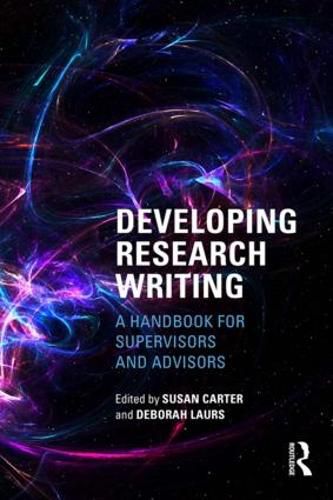Readings Newsletter
Become a Readings Member to make your shopping experience even easier.
Sign in or sign up for free!
You’re not far away from qualifying for FREE standard shipping within Australia
You’ve qualified for FREE standard shipping within Australia
The cart is loading…






Developing Research Writing is designed to encourage, inspire and improve the advisory practice of providing writing feedback. This book provides insights and advice that supervisors can use to advance their support of their research students’ writing and, at the same time, survive increasing supervisory demands.
Book parts are framed by empirical supervisor and doctoral student experiences and chapters within each part provide multiple approaches. The carefully chosen contributors are specialists on research writing and doctoral pedagogy, who guide the reader through the key stages of providing feedback. Split into nine key parts the book covers:
starting a new supervision with writing in focus;
making use of other resources along the way;
encouraging style through control of language;
writing feedback on English as an Additional Language (EAL) writing;
Master’s and Honours smaller projects’ writing feedback;
thesis by publication or performance-based writing;
maintaining and gathering momentum;
keeping the examiner happy;
writing feedback as nudging through identity transition.
The parts cohere into a go-to handbook for developing the supervision process. Drawing on research, literature and experience, Developing Research Writing offers well-theorized, yet practical and grounded advice conducive to good practices.
$9.00 standard shipping within Australia
FREE standard shipping within Australia for orders over $100.00
Express & International shipping calculated at checkout
Developing Research Writing is designed to encourage, inspire and improve the advisory practice of providing writing feedback. This book provides insights and advice that supervisors can use to advance their support of their research students’ writing and, at the same time, survive increasing supervisory demands.
Book parts are framed by empirical supervisor and doctoral student experiences and chapters within each part provide multiple approaches. The carefully chosen contributors are specialists on research writing and doctoral pedagogy, who guide the reader through the key stages of providing feedback. Split into nine key parts the book covers:
starting a new supervision with writing in focus;
making use of other resources along the way;
encouraging style through control of language;
writing feedback on English as an Additional Language (EAL) writing;
Master’s and Honours smaller projects’ writing feedback;
thesis by publication or performance-based writing;
maintaining and gathering momentum;
keeping the examiner happy;
writing feedback as nudging through identity transition.
The parts cohere into a go-to handbook for developing the supervision process. Drawing on research, literature and experience, Developing Research Writing offers well-theorized, yet practical and grounded advice conducive to good practices.